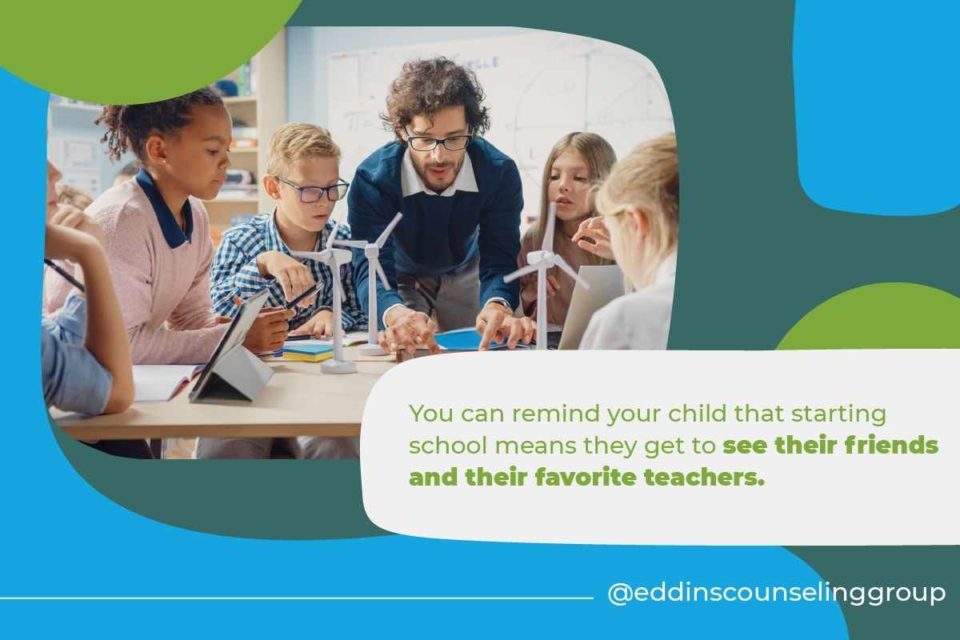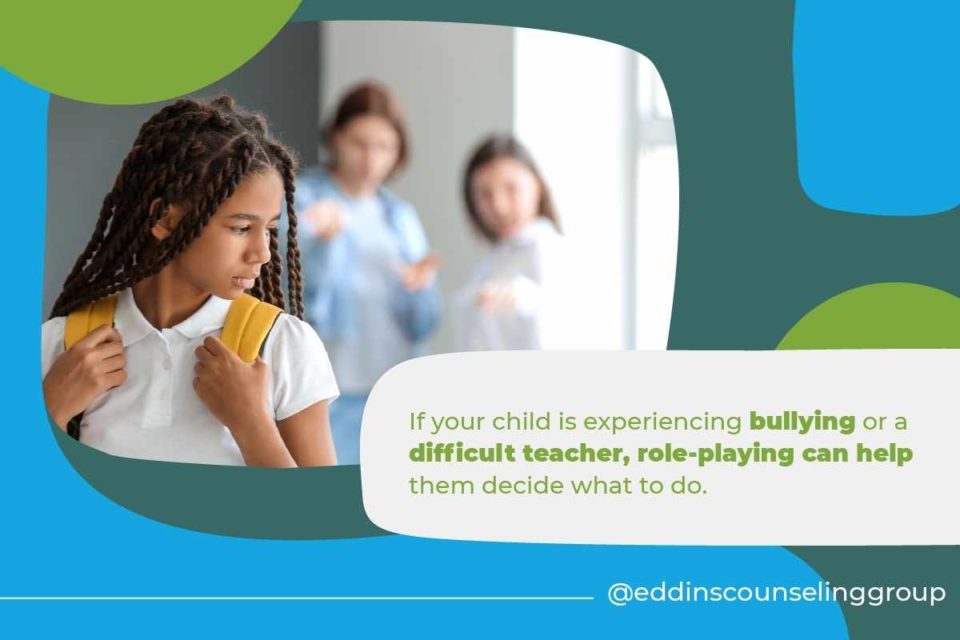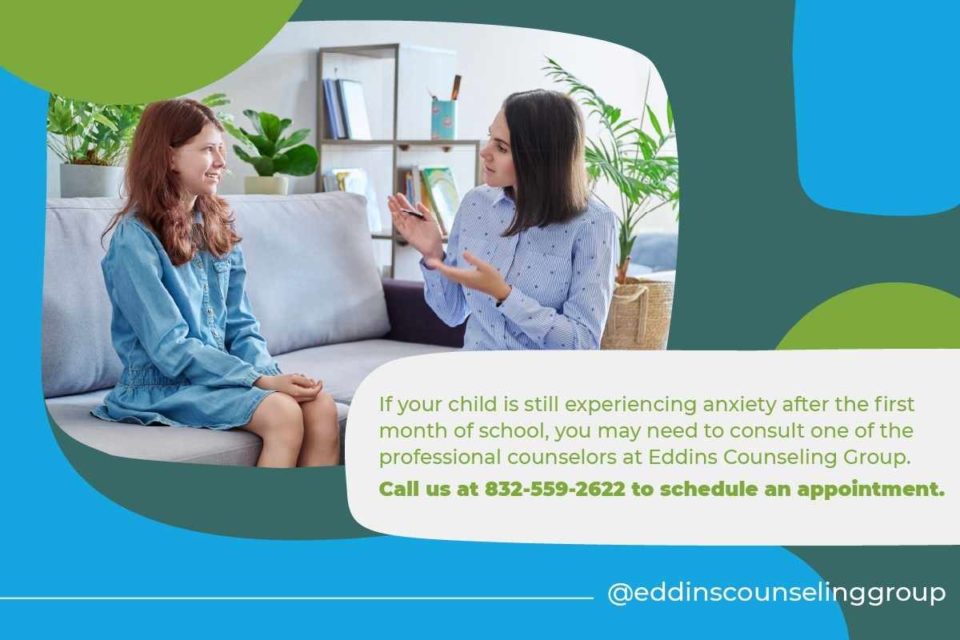September 1, 2022
Helping Your Child with Back to School Nerves
Written by Rachel Eddins
Posted in Child Counseling, Parenting & Family and with tags: children, school

Going back to class at the end of summer can be stressful for children and parents alike. It’s common for kids to be nervous on the first day of school or even for the first few weeks of a new school year.
Here are some reasons your child might feel anxious or stressed, signs the anxiety could be a cause for concern, and tips for easing the anxiety.
Common Reasons Kids Feel Stressed
Children often feel anxious or stressed when things change. They may feel nervous if their parents are going through a divorce, a loved one has died, or the family has moved recently.
Starting a new school with new classmates or living in a neighborhood that seems unsafe can be a source of stress as well. If money is tight for parents, kids may worry about it too.
Others often worry about getting good grades and standardized test scores.
Some kids have so many extracurricular activities that they’re busy most of the time and don’t have much free time to relax. Others may endure bullying or peer pressure from fellow students. As a result, they could have low self-esteem as well.
Kids who spent all or most of last year learning online because of COVID-19 may feel nervous at the prospect of resuming in-person learning.
Other everyday stressors can include arguing with a close friend, not getting a position on a sports team, adapting to a new learning environment, dealing with a difficult teacher, and not getting into advanced courses.

Common Signs of Stress
There are several ways to tell when a child’s anxiety could be cause for concern. Kids could exhibit:
- Tantrums when separating from their parents or caregivers to go to school.
- Trouble getting along with friends or family members.
- Avoidance of many routine activities inside and outside of school.
- Stomachaches, trouble sleeping alone, and fatigue.
- Nightmares or being afraid of the dark.
- A drop in grades or test scores.
- More clinginess than normal.
- Lots of negative thoughts or worries.
- Becoming angry or upset more quickly than usual.
- Difficulty concentrating.
- Fidgeting or restlessness.
If a child’s anxiety lasts longer than two weeks and starts to interfere with their daily life, they could have an anxiety disorder.
According to the National Institute of Mental Health, about 32% of people 13 to 18 years old have an anxiety disorder. Anxiety is more common among girls than boys, and about 8% of kids have a severe impairment. Untreated anxiety can lead to poor performance in school, problems maintaining friendships, depression, or even substance abuse.

Tips for Easing Anxiety Among Children
If you notice that your child is stressed, you may be able to make them feel better. Here are some tips for reducing anxiety in kids.
1. Talk to Them
One of the best ways to ease anxiety for children is to demonstrate that you’re trustworthy and caring. If you notice that your child seems upset, you can ask them what’s wrong without being overly accusatory or confrontational.
- If they don’t feel like talking, don’t pressure them too much.
- If they do want to talk, let them tell you the whole story, and try not to blame them for their previous decisions.
You can also ask them what they think they should do to solve a problem, such as low grades or bullying, and help them come up with new ideas.
2. Forgive Mistakes and Reward High Performance
It’s a good idea to let your child know that making occasional mistakes is OK and no one is perfect. When people make mistakes, they often learn from them and make better decisions in the future. To increase your child’s self-esteem, you can focus more on rewarding them for what they do well than on pointing out flaws.
3. Let Kids Have Some Free Time
You can also help kids relax by leaving some time in their schedules for play. If kids seem very busy with after-school jobs and extracurricular activities, they may need to reduce the number of activities they participate in.
4. Get Kids Ready for School
You can ease your child’s anxiety by making sure that they know what to expect when school starts. For example, a week or two before school, set a realistic bedtime and start selecting tomorrow’s clothes before your child goes to bed.
You can also arrange a few play dates with peers before school starts, so at least some kids in the class will be familiar with your child on the first day.
You can also visit the school before the school year starts. That way, you can make sure that your child knows the route and where they should wait for the school bus. If the building is open, your child can also practice walking inside.
Establishing a comfortable place where your child can do homework and planning school lunches ahead of time can also help relieve a child’s anxiety.
5. Talk About the Positive Aspects of School
You can remind your child that starting school means they get to see their friends and their favorite teachers. They can also have fun at the playground, the gym, the library, and other school locations.
6. Encourage Healthy Living
Make sure that kids get plenty of sleep and eat nutritious meals. A good breakfast is essential, and following a regular routine can make life feel more predictable.
7. Role-Play
If your child is experiencing bullying or a difficult teacher, role-playing can help them decide what to do. For example, you can ask your child to be the bully or teacher while you pretend to be the child and model a good response.

Next Steps
If your child is still experiencing anxiety after the first month of school, you may need to consult one of the child counselors at Eddins Counseling Group. Play therapy is available for younger kids.
If you can’t meet in person, phone and video-based online therapy are available options for your child.
Get started with one of our Houston, Montrose, or Sugar Land therapists today.


















